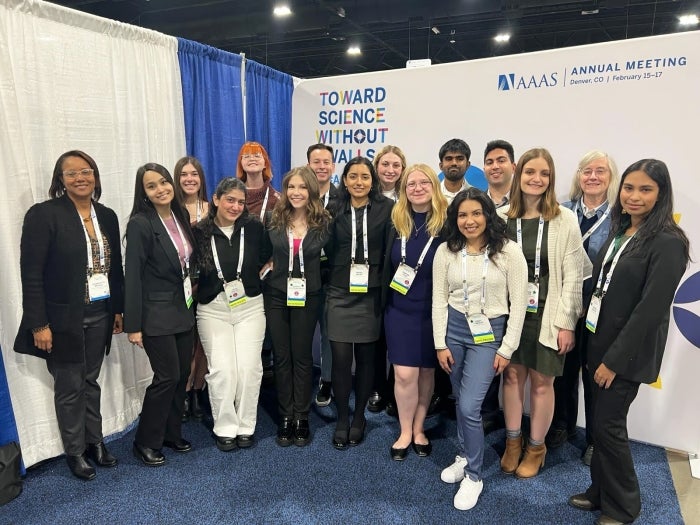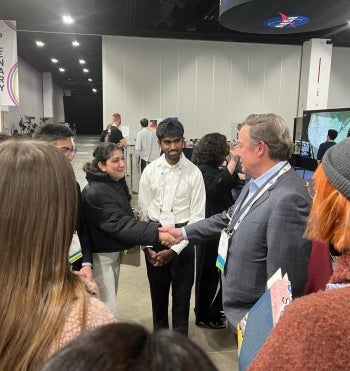ASU students compete at world’s largest general science conference

ASU President Michael Crow (center) took time to meet undergraduates and graduate students competing in the poster competition at the meeting for the American Association for the Advancement of Science. Photo courtesy the School of Life Sciences/ASU
A group of 15 Arizona State University students traveled to Denver, Colorado, last week for the annual meeting of the American Association for the Advancement of Science (AAAS), the largest general science conference in the world. The Center for Biology and Society and Barrett, The Honors College co-sponsor ASU students to travel to the AAAS conference each year and compete in the meeting’s poster competition.
“It was great to both network with everyone from ASU as well as scientists from different disciplines,” says Bryan Yavari, an undergraduate honors student in the neuroscience program, who presented a poster on his research investigating treatment techniques for colorectal cancer. Though Yavari has attended several conferences before, he particularly appreciated how supportive the group of students and faculty attending AAAS was: “I really like the community we had of helping and supporting each other through both traveling and presenting.”
For the contest, each student gave a three-minute presentation on a poster they designed to communicate their research to a general audience. The cohort, including four graduate students and 11 undergraduates from across ASU’s campuses, covered a wide range of topics in their presentations. Those topics included LGBTQ+ experiences in classroom settings, sea turtle conservation techniques and identifying how to make public events more inclusive through food choices.
“This was my first poster in graduate school, so I was really nervous,” said Olivia Davis, a fifth-year PhD candidate in the biology and society program who is about to defend her dissertation. She was presenting research on a metric she developed for conservation organizations to assess the status of endangered species more effectively.
Jane Maienschein and Jessica Ranney, the founding and assistant directors of the Center for Biology and Society, along with Georgette Briggs, an Honors Faculty Fellow at Barrett, helped students put together and practice their posters.
Davis said having support was important for putting together a poster she was proud of: “The fact that we had faculty helping us every step of the way really made a difference in how prepared I felt and how happy I was with the quality of the poster by the time I had to go present it.”
At the conference, the students had another surprise waiting for them. ASU President Michael Crow, who was one of the invited speakers at the conference’s closing plenary, took some time out of his schedule to meet the cohort and chat about their careers. He shared stories from his own career and gave the students advice about applying to graduate school and pursuing different career paths.
“That was so fun, actually,” said Moira MacCatherine, an undergraduate Barrett student in the nursing program at ASU’s downtown campus. “He was super interested in what we were studying. He asked us what our future plans were and what we were doing in school. He was awesome.”
MacCatherine’s poster displayed a tool she developed for nurses to assess newborns with Neonatal Opioid Withdrawal Syndrome, a condition that newborns could have if a parent used opioids while pregnant. MacCatherine hopes to become a neonatal nurse practitioner.
AAAS will officially announce the winners of the poster contest in April.
More Science and technology

Hack like you 'meme' it
What do pepperoni pizza, cat memes and an online dojo have in common?It turns out, these are all essential elements of a great cybersecurity hacking competition.And experts at Arizona State…

ASU professor breeds new tomato variety, the 'Desert Dew'
In an era defined by climate volatility and resource scarcity, researchers are developing crops that can survive — and thrive — under pressure.One such innovation is the newly released tomato variety…

Science meets play: ASU researcher makes developmental science hands-on for families
On a Friday morning at the Edna Vihel Arts Center in Tempe, toddlers dip paint brushes into bright colors, decorating paper fish. Nearby, children chase bubbles and move to music, while…



